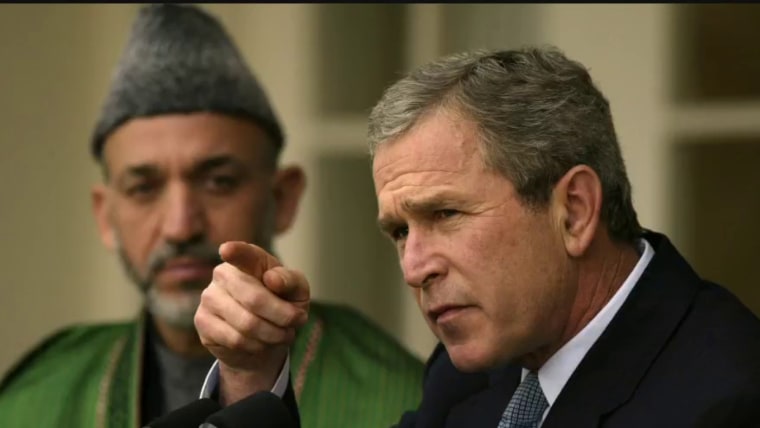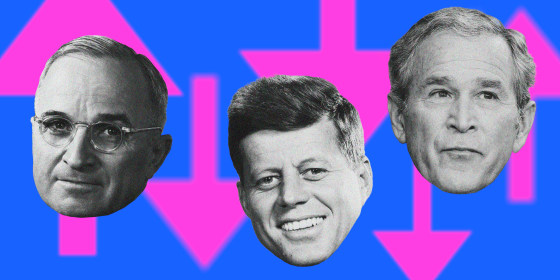The American presidency is one of the strangest jobs in the world.
Politicians aspire to it. The media focuses obsessively on the person who holds it and those who want to win it. Millions of books and articles have been written about it. And yet, most of the people who’ve held the job really weren’t that good.
There are a few truly great presidents, some pretty good ones and a handful of complete disasters. But most can be summed up, as the Simpsons famously once did, as the “adequate, forgettable, occasionally regrettable, caretaker presidents of the U.S.A.”
There are a few truly great presidents, some pretty good ones and a handful of complete disasters.
In fairness, the presidency radically changed in the 20th century, especially as the United States became a global power, so it’s a bit hard to compare the earlier commanders in chief to the modern ones. And despite the many mediocrities, ranking the presidents is a popular pastime, one I’ve dabbled in myself. So let’s ask a slightly different question: Who are the most overrated and underrated holders of the most thankless job in American politics?
Historians generally rank Franklin D. Roosevelt, Abraham Lincoln and George Washington as the three best presidents, and it’s hard to say that any of them are overrated — though Roosevelt's and Lincoln’s accomplishments (the former steered the country through economic calamity and world war and the latter saved the Union) were arguably more significant than Washington’s (whose greatest presidential act perhaps was relinquishing the job after two terms).
But I’ll make the case for Dwight D. Eisenhower as slightly underrated. On domestic policy, we’re still living in the shadow of his accomplishments: the national highway system, increased federal support for higher education and national investments in technology research and development. He also presided over a period of extraordinary national prosperity and growth.
On foreign policy, Eisenhower ended the Korean War, skillfully managed superpower relations, largely kept the U.S. out of foreign entanglements. And he slew the isolationist wing of the Republican Party and helped bring an end to McCarthyism. Critics will take issue with his civil rights record (somewhat deservedly) and his support for coups in Guatemala and Iran that installed pro-American dictators, but all in all, his tenure is remarkably solid — and I’d put him right behind the top three.

John F. Kennedy is another president who often shows up in the top 10 of historical rankings, but even though he served only a little more than two and a half years before his assassination, it’s still possible he doesn’t fully get his due. An essential part of the presidency is crisis management, and few presidents faced a more serious crisis than the Cuban Missile Crisis in the fall 1962. Even though all his top aides (including his brother Robert) argued for the use of American military force in Cuba, Kennedy demurred, instead reaching a diplomatic solution with Soviet leader Nikita Khrushchev that defused the superpower showdown. His high ranking by historians is, I believe, a tribute to how inspirational a figure he was to millions of Americans. But any president who skillfully manages a situation as potentially catastrophic as the Cuban Missile Crisis deserves high marks.
Ronald Reagan moves in and out of most top 10s, but I think he probably deserves to rank higher. His overall record on foreign policy is not great (including his support for the Contras in Nicaragua and death squads in El Salvador). But he helped to end the Cold War by giving Soviet leader Mikhail Gorbachev the political space to push reforms that ultimately led to its collapse (and, like Kennedy, overruled his close aides). I’m not a fan of Reagan’s domestic record of cutting taxes and weakening the regulatory state, but if we judge presidential effectiveness by the ability to enact one’s policy agenda, his record is strong. And he helped a Republican successor win re-election — a further indication of his political success.
Generally speaking, George W. Bush is considered an awful president. My argument is that he was worse than we remember.
What about those outside the top 10? I’ll put in a good word for George H.W. Bush. He lost his race for re-election, his handling of the economy was not great and he was a nasty and divisive campaigner. But on foreign policy he did a fantastic job of handling the breakup of the Soviet Union and the unification of Germany. His leadership of the Gulf War was masterful and arguably, his efforts on Arab-Israeli peace helped lead to the Oslo Accords in 1993. He also signed into law the Americans With Disabilities Act. Compared with most American presidents, that’s a pretty good track record.
What about overrated presidents? Others may disagree, but Harry Truman probably gets more credit than he deserves. Yes, the Marshall Plan, the creation of NATO and the U.N. system are huge deals. But his mishandling of the Korean War — and particularly his failure to rein in Gen. Douglas MacArthur as he sent U.S. troops farther north, baiting Communist China into invading and prolonging the war — is oddly swept under the rug. The Truman Doctrine, issued in 1947, turned the Cold War from a geopolitical contest into an ideological conflict and laid the foundation for America to define its national interests in near-limitless terms, which contributed to a host of foreign entanglements, including Vietnam. Perhaps that’s a bit unfair to Truman, but as the sign on his desk famously read: “The buck stops here.”
Also, Truman barely won re-election in 1948 and did so by running a vicious and nasty campaign that contributed to the adoption of McCarthyite tactics by Republicans. Four years later, he was so unpopular he couldn’t run for a second full term and arguably helped cost the Democrats the White House after it had held it for 20 years. Also, midterm elections in 1946 and 1950 were bloodbaths for Democrats. Politics is essential to the presidency, and Truman wasn’t all that great at it. Truman should rank high, but his presidency is more of a mixed bag than people realize.
Here’s one more overrated president to consider: George W. Bush. Yes, generally speaking, Bush is considered an awful president. My argument is that he was worse than we remember. There’s the Iraq War and all its accompanying disasters (torture, undermining civil liberties, mishandling Afghanistan). Not only did he not confront climate change, his policies arguably made it worse. His job creation record is one of the worst in modern history, and that’s almost separate from the fact that he sat by idly as the global economy fell apart in 2008. He’s so unpopular that even his own party acts as though he was never actually president.

After four years of Donald Trump’s dumpster fire of a presidency, Bush might have seemed “not that bad.” Nope, he was terrible, and next to Trump and Andrew Johnson, who took over for Lincoln and completely screwed up Reconstruction, the worst president in American history.
Bush is an easier president to assess than most modern occupants of the Oval Office, because the ledger of good and bad is clear. For example, what about Lyndon Johnson, who pushed for civil rights legislation and helped create the modern welfare state but also presided over the disastrous war in Vietnam? Woodrow Wilson was the first progressive to sit in the Oval Office. Under his tenure, the Federal Reserve and Securities and Exchange Commission came into existence. Labor laws and a federal income tax were enacted. His presidency laid the foundation for the modern administrative and regulatory state. Yet, he was also, arguably, the worst racist to hold the presidency, and he completely botched the peace he worked so hard to achieve after the horrors of World War I.
Barack Obama had no major scandals, was the nation’s first African American president and helped to bring the country through the worst economic downturn since the Great Depression. But his legislative accomplishments are relatively thin, and he couldn’t push his Democratic successor past the finish line in 2016. (One could make a similar argument about Bill Clinton, though less so on the scandal front.) There’s more good than bad in Obama’s résumé, but was he as transformative a president as Reagan or even Lyndon Johnson? Arguably no.
This is the other dirty little secret of the presidency. It’s an incredibly hard job. Domestic accomplishments are deeply reliant on who controls Congress. The great ones usually face a major crisis. No one who finishes the presidency comes out of the job smelling like roses. It almost makes you wonder why anyone wants the job — and why we spend so much time obsessing over it.

